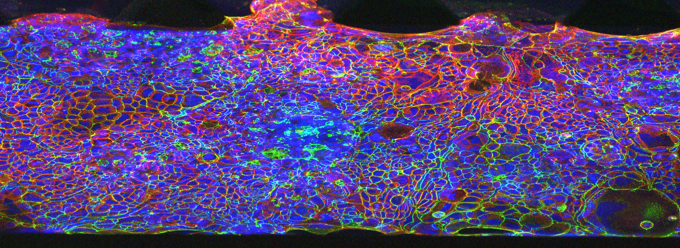Microbiome and Antitumor Immunity

Luigi Nezi
Group Leader
| [email protected] | |
| Telephone | +39 02 94375171 |
| Location |
Building 13
Floor 2nd Via Adamello 16, Milano |

Based on the most recent estimate of microbes populating the human body, we are made of bacteria at least as much of human cells and they coexist on our body as result of a dynamic equilibrium between Darwinian competition and cooperation. There is a growing appreciation of the role of the microbiome in cancer-related outcomes and our recent work demonstrated that differential bacterial “signatures” exist in the gut of melanoma patients that responded (R) or not (NR) to immunotherapy. Building on the synergy between scientists from different backgrounds to bridge the chasm between the bench and the clinic, our lab is seeking for innovative strategies to improve cancer prevention and response to immunotherapy by manipulating the human microbiome. We are interested in molecular mechanisms that regulate the crosstalk between innate and adaptive immune system in response to modulation of the microbiome, in particular in the gut.

We are generating and integrating multiOMIC datasets and developing new ex vivo and in vivo systems to create:
- Diagnostic tools, that could reveal high-risk subjects or potential R and NR patients, and guide subsequent immune-based therapeutics.
- Personalized interventions, by combining biotic and abiotic formulations to promote cancer prevention or turn NR patients in R.

Most Relevant Publications
-
Ballerini M, Galiè S, Tyagi P, Catozzi C, Raji H, Nabinejad A, Macandog ADG, Cordiale A, Slivinschi BI, Kugiejko KK, Freisa M, Occhetta P, Wargo JA, Ferrucci PF, Cocorocchio E, Segata N, Vignati A, Morgun A, Deleidi M, Manzo T, Rasponi M, Nezi L
A gut-on-a-chip incorporating human faecal samples and peristalsis predicts responses to immune checkpoint inhibitors for melanoma.
Nat Biomed Eng, 2025
-
Macandog ADG, Catozzi C, Capone M, Nabinejad A, Nanaware PP, Liu S, Vinjamuri S, Stunnenberg JA, Galiè S, Jodice MG, Montani F, Armanini F, Cassano E, Madonna G, Mallardo D, Mazzi B, Pece S, Tagliamonte M, Vanella V, Barberis M, Ferrucci PF, Blank CU, Bouvier M, Andrews MC, Xu X, Santambrogio L, Segata N, Buonaguro L, Cocorocchio E, Ascierto PA, Manzo T, Nezi L
Longitudinal analysis of the gut microbiota during anti-PD-1 therapy reveals stable microbial features of response in melanoma patients.
Cell Host Microbe, 2024
-
Tiberti S, Catozzi C, Croci O, Ballerini M, Cagnina D, Soriani C, Scirgolea C, Gong Z, He J, Macandog AD, Nabinejad A, Nava Lauson CB, Quinte' A, Bertalot G, Petz WL, Ravenda SP, Licursi V, Paci P, Rasponi M, Rotta L, Fazio N, Ren G, Fumagalli-Romario U, Schaefer MH, Campaner S, Lugli E, Nezi L*, Manzo T*
*Equal contribution.GZMKhigh CD8+ T effector memory cells are associated with CD15high neutrophil abundance in non-metastatic colorectal tumors and predict poor clinical outcome.
Nat Commun, 2022
-
Manzo T*, Prentice BM, Anderson KG, Raman A, Schalck A, Codreanu GS, Nava Lauson CB, Tiberti S, Raimondi A, Jones MA, Reyzer M, Bates BM, Spraggins JM, Patterson NH, McLean JA, Rai K, Tacchetti C, Tucci S, Wargo JA, Rodighiero S, Clise-Dwyer K, Sherrod SD, Kim M, Navin NE, Caprioli RM, Greenberg PD, Draetta G, Nezi L*
*Equal contribution.Accumulation of long-chain fatty acids in the tumor microenvironment drives dysfunction in intrapancreatic CD8+ T cells.
J Exp Med, 2020
PhD Student
Fellow
Undergraduate Student
Giorgia Puddu